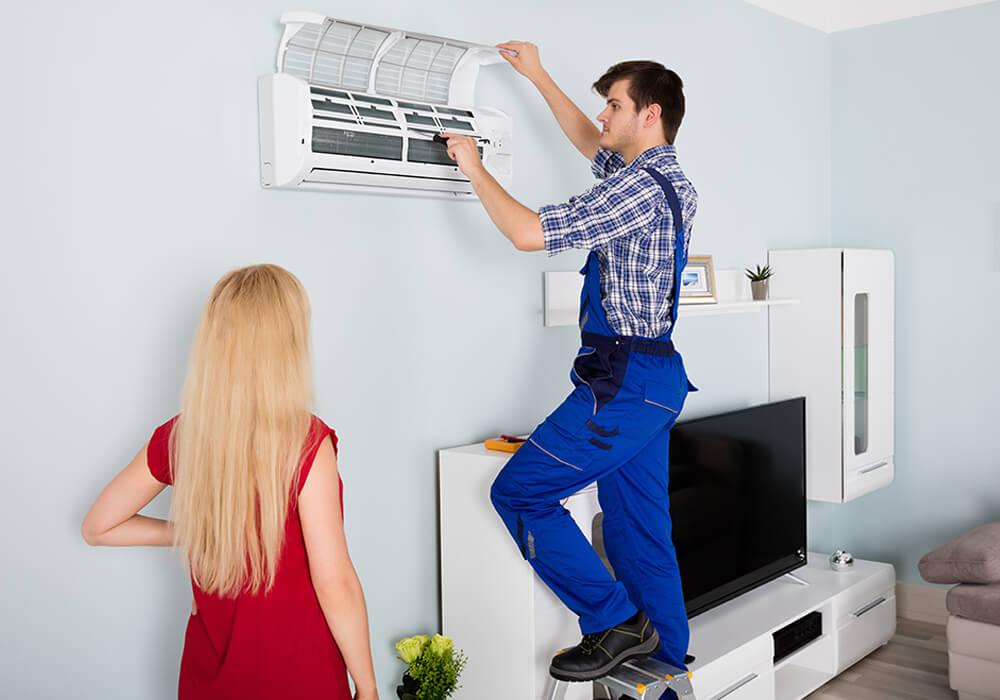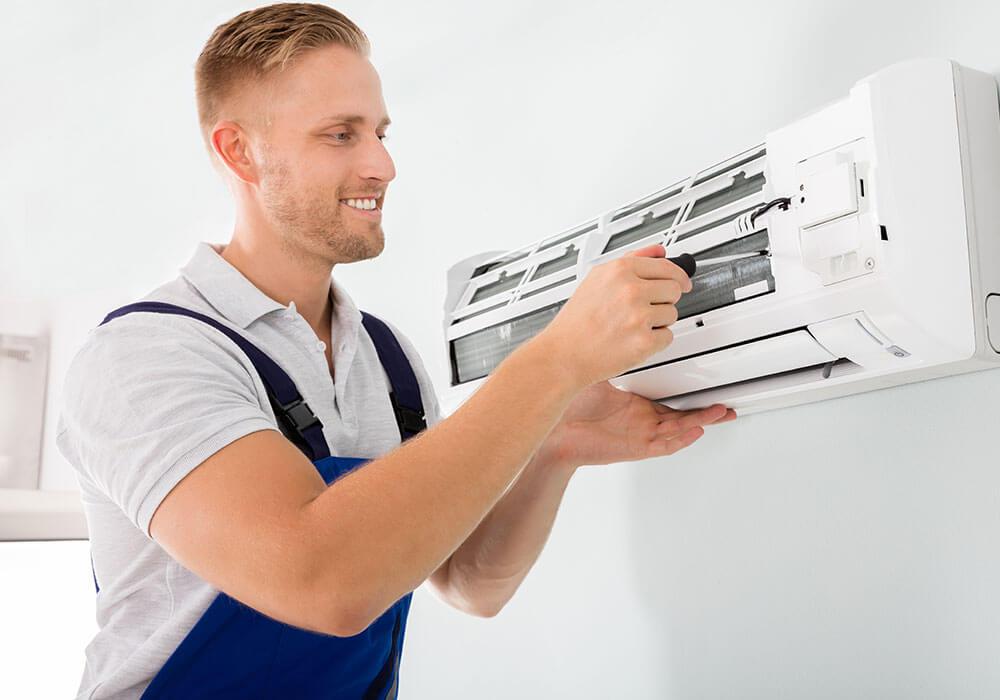
Navigating the 2023 HVAC Regulatory Maze: The Lowdown on Energy Efficiency Changes
Navigating the 2023 HVAC Regulatory Maze: The Lowdown on Energy Efficiency Changes Book NOW Cool Nick Air Conditioning Your Trusted
Home / FAQs
Residential and commercial air conditioning systems use pressurized refrigerant to remove excess heat and humidity. The refrigerant passes through a network of coils and valves that allow the coolant to absorb and release heat as it changes between its gas and liquid forms. Primary components include the evaporator and condenser coils, compressor, expansion valve, and fans.
As a rule of thumb, replacement is recommended when repairs would exceed half the cost of a new system. Age, efficiency, and reliability are also deciding factors. Replacement is typically the best option for HVAC systems that are more than 10 years old and have problems with frequent breakdowns, decreased output, increased runtimes, excessive noise, or rising energy use. Alternatively, homeowners can multiply the age of the system by the estimated cost of repairs. If the amount exceeds $5,000, replacement is typically the best solution.
Compressor malfunctions are typically caused by faulty electrical connections, defective capacitors, and improper refrigerant levels that affect the system’s operating pressure. Before calling a professional, homeowners can replace the air filter, double-check the thermostat settings, and hose off the outdoor unit to rule out minor maintenance-related problems. If these steps don’t resolve the issue, the compressor may need to be replaced. Unfortunately, compressors aren’t just one of the most critical components of the air conditioning system, they’re also one of the most expensive. If the unit can’t be repaired, a licensed HVAC contractor can determine whether a partial or full replacement is the best option.
Air ducts are responsible for a large portion of HVAC-related energy losses. According to the U.S. Environmental Protection Agency’s Energy Star program, 30% of heated and cooled air escapes from the ducts before it reaches its final destination. Some of the most common warning signs include hot and cold spots, odors, and low or no airflow. Loose ducts can be reconnected, and small cracks can be sealed with metallic foil tape. If the ducts are damaged, contaminated, or collapsed, it is usually time to call a professional. Trained AC technicians can also determine if the supply and return ducts are properly sized.
Homeowners’ insurance covers the cost of AC breakdowns caused by fire, lightning strikes, vandalism, or theft. To qualify for coverage, the homeowner must notify the insurance carrier of the loss and provide a report from a licensed contractor. Then, an insurance adjuster will evaluate the claim. Unfortunately, insurance coverage may only pay a limited amount, especially if the homeowner has a high-deductible policy.
The average AC system has an expected lifespan of 14 years. Longevity can vary substantially depending on the unit’s maintenance history and building-related factors that determine how often the system runs. Homeowners can extend the life of their HVAC equipment by scheduling annual maintenance, replacing filters monthly, and using recommended thermostat settings.
Preventive AC maintenance is the key to increased longevity. Here are a few of the most beneficial tasks that homeowners can perform themselves.
If problems arise, it’s wise to contact a professional as soon as possible to avoid more extensive repairs. Responding quickly is the best way to prevent sudden breakdowns that may require a more expensive emergency service call.

Navigating the 2023 HVAC Regulatory Maze: The Lowdown on Energy Efficiency Changes Book NOW Cool Nick Air Conditioning Your Trusted

When it comes to weather, Florida is like no other place in the United States. While many regions experience four distinct seasons, the Sunshine State offers its own unique challenge – unpredictability. In Florida, you might find yourself needing air conditioning during the so-called “winter” months. At AC Designs, we understand the quirks of Florida’s climate, and we’re committed to helping you keep your HVAC system running efficiently year-round.

15 Ways to Reduce Air Conditioning Costs: Cool Savings, Hot Tips Book NOW Cool Nick Air Conditioning Your Trusted Partner

Navigating the 2023 HVAC Regulatory Maze: The Lowdown on Energy Efficiency Changes Book NOW Cool Nick Air Conditioning Your Trusted Partner for AC Excellence in South Florida. Hey there, you energy-savvy aficionados! Let’s talk about something that’s got everyone buzzing—the new federal regulations on HVAC systems for 2023. Are your eyes glazing over already? Stick with me; this is important

When it comes to weather, Florida is like no other place in the United States. While many regions experience four distinct seasons, the Sunshine State offers its own unique challenge – unpredictability. In Florida, you might find yourself needing air conditioning during the so-called “winter” months. At AC Designs, we understand the quirks of Florida’s climate, and we’re committed to helping you keep your HVAC system running efficiently year-round.

15 Ways to Reduce Air Conditioning Costs: Cool Savings, Hot Tips Book NOW Cool Nick Air Conditioning Your Trusted Partner for AC Excellence in South Florida. Hey there, cool cats and savvy savers! We’re about to drop some knowledge that’s so hot, you’ll need your AC to cool down—or will you? Summer’s here, and the sizzling heat is a direct
Subscribe to our newsletter to receive the latest news and exclusive offers from our team. No spam.
Cool Nick Air Conditioning, Inc.
We firmly believe that the internet should be available and accessible to anyone, and are committed to providing a website that is accessible to the widest possible audience, regardless of circumstance and ability.
To fulfill this, we aim to adhere as strictly as possible to the World Wide Web Consortium’s (W3C) Web Content Accessibility Guidelines 2.1 (WCAG 2.1) at the AA level. These guidelines explain how to make web content accessible to people with a wide array of disabilities. Complying with those guidelines helps us ensure that the website is accessible to all people: blind people, people with motor impairments, visual impairment, cognitive disabilities, and more.
This website utilizes various technologies that are meant to make it as accessible as possible at all times. We utilize an accessibility interface that allows persons with specific disabilities to adjust the website’s UI (user interface) and design it to their personal needs.
Additionally, the website utilizes an AI-based application that runs in the background and optimizes its accessibility level constantly. This application remediates the website’s HTML, adapts Its functionality and behavior for screen-readers used by the blind users, and for keyboard functions used by individuals with motor impairments.
If you’ve found a malfunction or have ideas for improvement, we’ll be happy to hear from you. You can reach out to the website’s operators by using the following email
Our website implements the ARIA attributes (Accessible Rich Internet Applications) technique, alongside various different behavioral changes, to ensure blind users visiting with screen-readers are able to read, comprehend, and enjoy the website’s functions. As soon as a user with a screen-reader enters your site, they immediately receive a prompt to enter the Screen-Reader Profile so they can browse and operate your site effectively. Here’s how our website covers some of the most important screen-reader requirements, alongside console screenshots of code examples:
Screen-reader optimization: we run a background process that learns the website’s components from top to bottom, to ensure ongoing compliance even when updating the website. In this process, we provide screen-readers with meaningful data using the ARIA set of attributes. For example, we provide accurate form labels; descriptions for actionable icons (social media icons, search icons, cart icons, etc.); validation guidance for form inputs; element roles such as buttons, menus, modal dialogues (popups), and others. Additionally, the background process scans all the website’s images and provides an accurate and meaningful image-object-recognition-based description as an ALT (alternate text) tag for images that are not described. It will also extract texts that are embedded within the image, using an OCR (optical character recognition) technology. To turn on screen-reader adjustments at any time, users need only to press the Alt+1 keyboard combination. Screen-reader users also get automatic announcements to turn the Screen-reader mode on as soon as they enter the website.
These adjustments are compatible with all popular screen readers, including JAWS and NVDA.
Keyboard navigation optimization: The background process also adjusts the website’s HTML, and adds various behaviors using JavaScript code to make the website operable by the keyboard. This includes the ability to navigate the website using the Tab and Shift+Tab keys, operate dropdowns with the arrow keys, close them with Esc, trigger buttons and links using the Enter key, navigate between radio and checkbox elements using the arrow keys, and fill them in with the Spacebar or Enter key.Additionally, keyboard users will find quick-navigation and content-skip menus, available at any time by clicking Alt+1, or as the first elements of the site while navigating with the keyboard. The background process also handles triggered popups by moving the keyboard focus towards them as soon as they appear, and not allow the focus drift outside it.
Users can also use shortcuts such as “M” (menus), “H” (headings), “F” (forms), “B” (buttons), and “G” (graphics) to jump to specific elements.
We aim to support the widest array of browsers and assistive technologies as possible, so our users can choose the best fitting tools for them, with as few limitations as possible. Therefore, we have worked very hard to be able to support all major systems that comprise over 95% of the user market share including Google Chrome, Mozilla Firefox, Apple Safari, Opera and Microsoft Edge, JAWS and NVDA (screen readers).
Despite our very best efforts to allow anybody to adjust the website to their needs. There may still be pages or sections that are not fully accessible, are in the process of becoming accessible, or are lacking an adequate technological solution to make them accessible. Still, we are continually improving our accessibility, adding, updating and improving its options and features, and developing and adopting new technologies. All this is meant to reach the optimal level of accessibility, following technological advancements. For any assistance, please reach out to